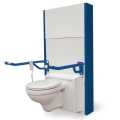

FRR - Friendly Rest Rooms for Elderly People / Intelligent Toilet
EU funded research project (Jan 2002 - Mar 2005)
 Diese Seite auf Deutsch
Diese Seite auf Deutsch

Toilet facilities in private and public places presently do not fit the specific needs of many old persons with physical and cognitive limitations.
The objective of this project was to carry out the necessary research and design, the engineering and evaluation of prototypes for a Friendly Rest Room (FRR) for older persons and/or persons with disabilities.
The elements of the FRR should be able to adjust to the individual needs of older persons with functional limitations or disabilities, allowing them to gain greater autonomy, independence, self-esteem, dignity, safety, improved self-care and therefore enable them to enjoy a better quality of life.
The consortium brought together end-user organizations representing a wide range of European countries (more than 30), universities, research and rehabilitation centres as well as industrial partners from design and sanitary industry.
The project involved broad user driven research to define the user parameters for designing and developing the FRR systems. User involvement (primary as well as secondary users) took place in all the stages of the design and evaluation of the iterative prototypes.
Several successive prototype generations of Friendly Rest Rooms where many of the components are adjustable to the needs of older persons with varying degrees of functional impairment were designed, developed and tested at 5 European test sites. Additionally to laboratory tests a very successful real life evaluation was done.
The methods and technologies involved range from contactless smart card technologies (RFID) with read-write capabilities, voice activation interface, motion control and sensor systems, mechanical engineering and robotic techniques, mathematical modelling, as well as ergonomic research, design for all philosophy, gerontechnology and medical and social sciences.
The research results of the project were presented and discussed at a closing conference in March 2005. There, an outstanding presentation about the benefits of a smart toilet was delivered by a group of users and care persons who had tested one of the prototype systems in real life environment over a period of 2 months.
In January 2006 a first product version was
brought to European market by Hungarian company ![]() Santis Kft.
In mid 2011 a book about FRR research results was published.
Santis Kft.
In mid 2011 a book about FRR research results was published.
On March 17th, 2005 the final FRR conference took place at
![]() Caritas Socialis care and social centre in Vienna. The
project consortium presented the main outcomes of the research and development activities.
Caritas Socialis care and social centre in Vienna. The
project consortium presented the main outcomes of the research and development activities.
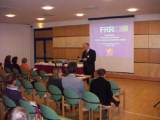
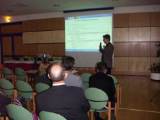

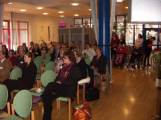

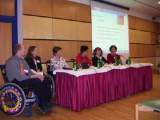
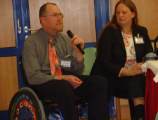


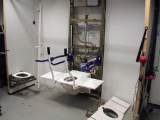
 Download PDF
Download PDF
FRR Concept and Industrial Design of FRR Components: Design solutions, concepts and final designs, in visual and textual form of, amongst others, the Transfer Seat, Door Handles, Communication Unit, Vertical Grab Bars, Wall mounted Grab Bars, Accessibility Sign, Comfort Wash Basin, additional storage functions and interfaction design.
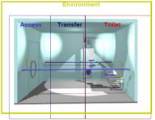
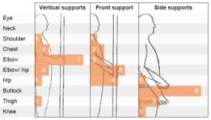
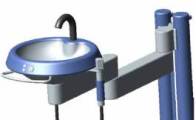
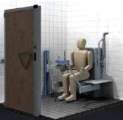
 Download PDF
Download PDF
 Download PDF
Download PDF
FRR Laboratory Prototypes: Several prototype generations have been tested in laboratory settings at up to 5 European test sites. The prototypes provide different functionalities, e.g. in Vienna: height and tilt adjustable toilet bowl, new types of toilet seats and grab bars, smart card technology to store users’ preferences, hand held computer based interface demonstrator, multi lingual audible feedback, scaleable, optional scanning mode, prompting mode, voice control, voice output, alarm and safety systems, sensor systems for fall recognition and for automatic adaption to the preferred sitting height.
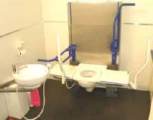
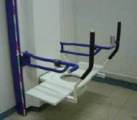

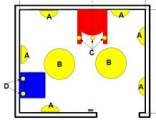
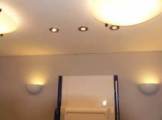
 Download PDF
Download PDF
 Download PDF
Download PDF
 Download PDF
Download PDF
 Download PDF
Download PDF
 Download PDF
Download PDF
Remark: Some of the prototypes still can be demonstrated at the test sites. Please contact the
user test site next to you:
Austria (Vienna): partners fortec & Eurag,
Sweden (Lund): partner Certec,
Greece (Athens): partners UoA & Hagg,
The Netherlands (Delft): partner TU Delft,
Italy (Milan): partner SIVA.
The contact persons can be found here.
End-user preferences: (older people and persons with disabilities as well as secondary users) on friendly toilets for private homes and semi-public places.
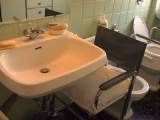
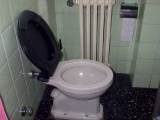
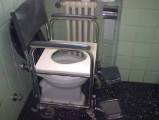
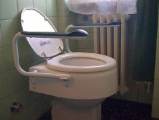


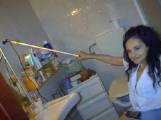
 Download PDF
Download PDF
FRR Real Life Prototype and Knowledge on the Context of Use: In a field study carried out at an MS day care center in Vienna, new knowledge was gained on the contextual factors related to the use of toilet in such a setting. The FRR real life prototype consists of an height and tilt adjustable toilet and selected FRR modules: sensor systems for tilt and height of bowl, interface to alarm system, door monitoring, monitoring of buttons pressed on hand held control device, new type of door handles, smart card reader for user identification, remote maintenance of FRR software via IP connection, control and interface software. The knowledge gained here can be used to enhance the quality of further AT-products in this area.
![]()
![]()
![]()
![]()
![]()
![]()
![]()
![]()
![]()
![]()
![]()
![]()
![]()
![]()
Panorama views from inside and outside of the toilet room.
 Download PDF
Download PDF
 Download PDF
Download PDF
Remark: This prototype still is in daily use in the day care centre. On request it
can be demonstrated to interested parties. Please contact Ms. Ramona Rosenthal , email: ramona.rosenthal@cs.or.at,
head of ![]() MS day care centre of Caritas Socialis. Or contact
Ms. Sabina Dirnberger, email: sabina.dirnberger@cs.or.at, head of PR.
MS day care centre of Caritas Socialis. Or contact
Ms. Sabina Dirnberger, email: sabina.dirnberger@cs.or.at, head of PR.
Methodology for User Involvement: Refined methodology of involving primary and secondary users in activities of user centred design and user driven research in sensitive areas like toileting, relating established methodologies of social research with ethical considerations.
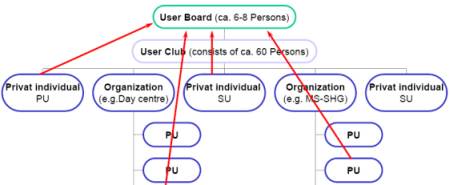
 Download PDF
Download PDF
Ethical Guidlines: For protecting fragile users in user centred design processes.
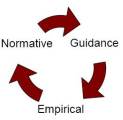
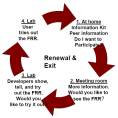
 Download PDF
Download PDF
Quantified Insights into the Social and Psychological Scope of the Problems Caused by Indadequate Toilet Facilities in Several European Countries: By distributing a paper-pencil questionnaire in Austria, Germany, Greece, Italy and Switzerland (N=335), we gathered knowledge concerning the extent to which the lack of assistive toilets reduces the quality of life of older persons and persons with physical disabilities by restricting their social mobility.
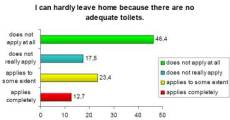
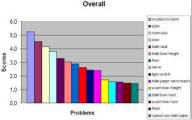
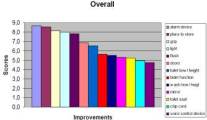
 Download PDF
Download PDF
Extended Tools for Computer Based Interviews (CBI): Text and pictorial content computer based interviews deliverable over the www and alternativley in stand-alone format for non-networked PC, Translation tool for creating various language versions of the CBIs, panoramic virtual reality tool for giving a virtual tour through rest room prototypes and recording comments about them.

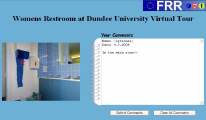
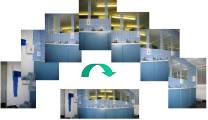
 Download PDF
Download PDF
Methods questioning Users on Sensitive User Behaviour: Visual questionnaire on toiletting behaviour, in particular personal hygiene and postures related to toiletting. Basis for computer based interviewing.
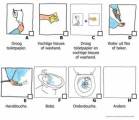

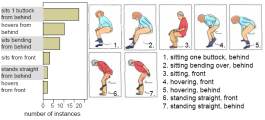
 Download PDF
Download PDF
FRR Knowledge Base: running on external site.
FRR Book titled: “A Friendly Rest Room: Developing Toilets of the Future for Disabled and Elderly People”,
in ![]() Assistive Technology Research Series, IOS press, Amsterdam, 2011
Assistive Technology Research Series, IOS press, Amsterdam, 2011
Pre-Production Prototypes of basic FRR components: Lift WC with support function for sitting down and getting up, transfer seat to offer more safety and comfort to users and to allow an easy transfer from a wheelchait to the toilet, Wall mounted grab bars, horizontal body support bars, Space-saving door, door handle (Landmark) with lock mechanism, Communication unit.
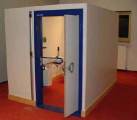
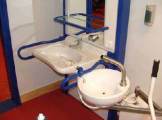
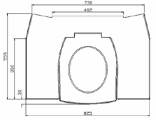
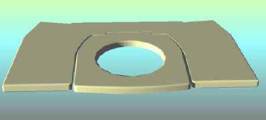
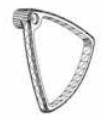

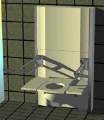
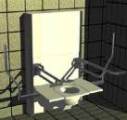
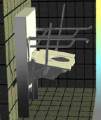
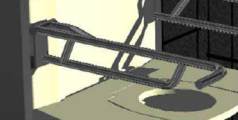
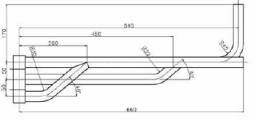
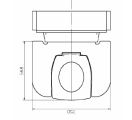
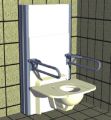
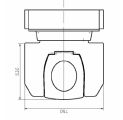
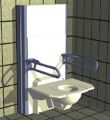




 Download PDF
Download PDF
 Download PDF
Download PDF
 Download PDF
Download PDF

Contact person for customers and resellers:
Mr. Atilla Rist
Santis Kft.
Kard utca. 80
H-4033 Debrecen
Hungary
Tel.: +36 52 53 5325
Fax: +36 52 53 5326
Mobile: +36 30 96 58 991
Email: atillarist@yahoo.de
Web: ![]() http://www.santis.org
http://www.santis.org
Further links:
![]() http://www.cstechnologie.com and
http://www.cstechnologie.com and
![]() http://www.conplan.org
http://www.conplan.org
The previous LiftWC product (which partly also was used as base for designing the new FRR Laboratory Prototypes and the FRR Real Life Test Prototype) and the FRR product version are distributed in Austria via company HOBI. Contact person:
Martin Hobiger
HOBI Behindertenbehelf Ges.m.b.H.
Gewerbepark B17/II Straße1/2
A-2524 Teesdorf, Austria
Phone: +43(0)2253-810 60
Fax: Fax: +43(0)2253-810 60-50
Email: mhobiger@hobi.at
Web: ![]() http://www.hobi.at
http://www.hobi.at
(14) Das entgegenkommende Örtchen [The co-operative Loo], report in German Radio (Deutschlandfunk, in German) by Franz Zeller
on June 20, 2005.
![]() Link to Deutschlandfunk - Forschung aktuell web site.
Downloads: Report length 3:53 minutes
as MP3 (size: 0.9MB) |
as RM (size: 1.0MB) |
as WMA (size: 0.5MB) |
as WAV (size: 10.3MB) |
Information in writing
Link to Deutschlandfunk - Forschung aktuell web site.
Downloads: Report length 3:53 minutes
as MP3 (size: 0.9MB) |
as RM (size: 1.0MB) |
as WMA (size: 0.5MB) |
as WAV (size: 10.3MB) |
Information in writing  Download PDF
Download PDF
(13) Intelligente Toilette [Intelligent Toilet], report in Austrian Radio (Oe1 Dimensionen, in German) by Franz Zeller, on June 10, 2005.
![]() Link to Oe1 web site.
Downloads: Report length 5:40 minutes
as MP3 (size: 1.4MB) |
as RM (size: 0.7MB) |
as WMA (size: 0.7MB) |
as WAV (size: 15.1MB) |
Information in writing
Link to Oe1 web site.
Downloads: Report length 5:40 minutes
as MP3 (size: 1.4MB) |
as RM (size: 0.7MB) |
as WMA (size: 0.7MB) |
as WAV (size: 15.1MB) |
Information in writing  Download PDF
Download PDF
(12) Report in ![]() Radio Stephansdom by Stefan Hauser, June 11th, 2005
Radio Stephansdom by Stefan Hauser, June 11th, 2005
(11) "Toilette mit Hirn" geht in Produktion [Toilet with Brains moves into production, in German], by Hannes Wieder,
in: Bezirksjournal [local Viennese Newspaper], p.24, June 2005,
 Download PDF
Download PDF
(10) ![]() Neue Toilette für körperlich Behinderte entwickelt [New toilet for motor impaired persons developed, in German], News Letter of International Rehacare fair, Duesseldorf, Germany, 31/05/2005
Neue Toilette für körperlich Behinderte entwickelt [New toilet for motor impaired persons developed, in German], News Letter of International Rehacare fair, Duesseldorf, Germany, 31/05/2005
(9) Computer gesteuerter Toilette [Computer controlled toilet], Austrian TV Report (duration: 30 seconds, in German)
in ![]() ORF Wien heute
on May 23, 2005. Download: video stream (WMV 1,2MB) |
MPG file (8,1MB)
ORF Wien heute
on May 23, 2005. Download: video stream (WMV 1,2MB) |
MPG file (8,1MB)
(8) ![]() TU Wien: Toilette mit Hirn bewährte sich im Praxistext [TU Vienna: Toilet with Brains
succeeded real life test, in German], Informationsdienst Wissenschaft, May 20th, 2005
TU Wien: Toilette mit Hirn bewährte sich im Praxistext [TU Vienna: Toilet with Brains
succeeded real life test, in German], Informationsdienst Wissenschaft, May 20th, 2005
(7) Media reports in German language (online and/or printed, selected): Austria: Standard, Kurier, Vorarlberger Nachrichten, Oberoesterreichischen Nachrichten, WienWeb, Austria Online, ORF future zone, ORF Science. Germany: Die Zeit, Springer Geosciences online.
(6) Media reports in English language (online and/or printed, selected): United States: ![]() CNN, ABC, CBS, New York Times
CNN, ABC, CBS, New York Times
 Download PDF ,
Washington Post, Washington Times, YahooNews. United Kingdom: The Times, BBC (
Download PDF ,
Washington Post, Washington Times, YahooNews. United Kingdom: The Times, BBC (![]() Link to Weblog). Additional reports in South Africa, Near East, Bangladesh,
Singapore, Thailand, China and Japan.
Link to Weblog). Additional reports in South Africa, Near East, Bangladesh,
Singapore, Thailand, China and Japan.
(5) ![]() Mehr Selbständigkeit durch "Toilette mit Hirn", [More Autonomy by a "toilet with brains", in German], press release by Caritas Socialis,
May 19th, 2005
Mehr Selbständigkeit durch "Toilette mit Hirn", [More Autonomy by a "toilet with brains", in German], press release by Caritas Socialis,
May 19th, 2005
(4) Usability - Im Mittelpunkt der Mensch [Usability - Human Being in the Centre], Mario Wally, in: Profil Extra 35/2004, p.54-58, Aug 2004 (in German),
 Downlad PDF,
Downlad PDF,
 Download PDF text only version
Download PDF text only version
(3) Prototypentest - Toiletten mit Hirn [Test of Prototypes - Toilets with Brains, in German], Hannes Wieser, in: Bezirksjournal
[local Viennese Newspaper], p.20, (in German), June 2004,  Download PDF
Download PDF
(2) Handicap Toilette, Robert Schlathau, in: Neue Horizonte, Journal of the Austrian MS Society, p. 23-24, 4/2003, Nummer 122, 38.
Jahrgang, Dec 2003,  Download PDF
Download PDF
(1) ![]() Forschungsnachricht "Toiletten mit Hirn" [Research news "toilets with brains", in German], May 2002
Forschungsnachricht "Toiletten mit Hirn" [Research news "toilets with brains", in German], May 2002
(8) ![]() Integra Austrian National Fair, Wels, Upper Austria, Sept 20-22, 2006
Integra Austrian National Fair, Wels, Upper Austria, Sept 20-22, 2006
(7) ![]() Research Benefits for the Ageing Population, Dissemination Conference for European Research Results, Helsinki, Sept 14-15, 2006
Research Benefits for the Ageing Population, Dissemination Conference for European Research Results, Helsinki, Sept 14-15, 2006
(6) ![]() Forum IKT (German) Austrian National Conference (in German), Linz, Upper Austria, July 10-11, 2006
Forum IKT (German) Austrian National Conference (in German), Linz, Upper Austria, July 10-11, 2006
(5) ![]() Ageing and Disability - Disabled people are ageing, ageing people are becoming disabled, June 8-9, 2006, Graz, Austria
Ageing and Disability - Disabled people are ageing, ageing people are becoming disabled, June 8-9, 2006, Graz, Austria  Download Handouts PDF |
Download Handouts PDF |  Download Accessible Slides PDF.
Download Accessible Slides PDF.
(4) ![]() Senior and Nursing Homes exhibition of Austrian Trade Commissions Munich in Rosenheim, Germany, on Jan 26, 2006:
picture 1 | picture 2
Senior and Nursing Homes exhibition of Austrian Trade Commissions Munich in Rosenheim, Germany, on Jan 26, 2006:
picture 1 | picture 2
(3) ![]() 18th Intern. EURAG 2005 Congress Sept 29 - Oct 1, 2005 in Ljubljana, Slovenia:
picture 1 | picture 2 | picture 3
18th Intern. EURAG 2005 Congress Sept 29 - Oct 1, 2005 in Ljubljana, Slovenia:
picture 1 | picture 2 | picture 3
(2) ![]() Rehacare International Fair, Duesseldorf, Germany, Nov 11, 2004, during FRR mini workshop
Rehacare International Fair, Duesseldorf, Germany, Nov 11, 2004, during FRR mini workshop
(1) ![]() Integra Austrian National Fair, Wels, Upper Austria, Sept 15-17, 2004, on fortec's booth
Integra Austrian National Fair, Wels, Upper Austria, Sept 15-17, 2004, on fortec's booth
(39) J.F.M. Molenbroek, J. Mantas and R. De Bruin (Eds.): A Friendly Rest Room: Developing Toilets of the Future for Disabled and Elderly People, Volume 27, ![]() Assistive Technology Research Series, 304 pp., IOS press, June 2011
Assistive Technology Research Series, 304 pp., IOS press, June 2011
(38) P. Panek: Designing for Intimate Needs: Ambient Intelligence in a Rest Room, In: Päivi Topo, Britt Östlund (Eds): Dementia, Design and Technology - Time to Get Involved, Assistive Technology Research Series, volume 24, IOS press, Amsterdam, pp. 111-124, 2009.
(37) Marianne Egger de Campo, Christian Dayé, Paul Panek: Creating Friendly Rest Rooms by Involving Older and Disabled Users in the RTD Process, invited presentation at: ![]() Research Benefits for the Ageing Population - Dissemination Conference for European Research Results, organised by STAKES and the European Commission under the Finnish EU Presidency, September 14 – 15, 2006 in Helsinki, Finland
Research Benefits for the Ageing Population - Dissemination Conference for European Research Results, organised by STAKES and the European Commission under the Finnish EU Presidency, September 14 – 15, 2006 in Helsinki, Finland
(36) P. Panek, G. Edelmayer, P. Mayer, W.L. Zagler: Die anwenderfreundliche, intelligente Toilette, accepted for IKT-Forum für und mit Menschen mit Behinderungen: Forschung – Entwicklung – Anwendung , 10. Juli – 11. Juli 2006, im Rahmen der ICCHP-Konferenz an der Johannes Kepler Universität Linz, Austria
(35) C. Dayé, G. Hansen, P. Panek: Assistive Technology for Persons with Disabilities and Older People with Impaired Mobility, Workshop at the Conference ![]() Ageing and Disability - Disabled people are ageing, ageing people are becoming disabled, June 8-9, 2006, Graz, Austria (24 pages)
Ageing and Disability - Disabled people are ageing, ageing people are becoming disabled, June 8-9, 2006, Graz, Austria (24 pages)  Download Handouts PDF |
Download Handouts PDF |  Download Accessible Slides PDF.
Download Accessible Slides PDF.
(34) Martin Richter: ![]() Care in Progress – Roboter für Pflege, Service und Therapie [Care in Progress - Robots for Care, Service and Therapy], photographic essay, Hamburg, 2006,
Care in Progress – Roboter für Pflege, Service und Therapie [Care in Progress - Robots for Care, Service and Therapy], photographic essay, Hamburg, 2006, ![]() Link to http://www.martinrichterfotografie.de.
Link to http://www.martinrichterfotografie.de.
(33) P. Panek, G. Edelmayer, C. Dayé, W.L. Zagler: Concept and Evaluation Methodology of Adjustable Toilets for Old Persons and People with Disabilities, Poster: EMBEC 05 3rd European Medical & Biological Engineering Conference, Prague; 20.11.2005 - 25.11.2005; in: "IFMBE Proceedings", 11 (2005), ISSN 1727-1983; 5 pages
(32) G. Edelmayer, P. Panek, P. Mayer, W.L. Zagler: Technologies for Smart Toilets, mstnews, bi-monthly journal for micro and nano technologies, issue on Ambient Assisted Living, VDI/VDE-IT, Germany, No 05/05, pp. 14-16 and 35, 2005  Download PDF |
Download PDF |  Download PDF of full length
Download PDF of full length
(31) P. Panek, G. Edelmayer, P. Mayer , W. L. Zagler: New Assistive Technologies in the Toilet Room, in: G. Teissl, G. Dayé, A. Krajnc (Eds.): Perspectives of older people in Europe, invited presentation on XVIII International EURAG Congress, Ljubljana, Sept 29 - Oct 1, 2005, pp. 56-57 [with translations into Slovenian: Nove podporne tehnologije, ki pomagajo na stranišcih, pp. 27-28, German: Neue unterstützende Technologien in Toilettenräumen, pp. 87-88, Italian: Nuove Tecnologie d'Assistenza nella Toilette, pp. 118-119]
(30) G. Edelmayer, P. Mayer, P. Panek, R. Schlathau, W.L. Zagler: Forschungsprototyp einer sich selbständig an die Benutzerwünsche anpassenden Toilette, accepted for oral presentation at Oesterreichtag, Vienna city hall, Sept 29-30, 2005
(29) R. Schlathau, C. Dayé, G. Edelmayer, N. Gentile, P. Mayer, P. Panek and W. L. Zagler: User Driven Development of an Intelligent Toilet to Improve Quality of Life, poster abstract accepted for Scientific Symposium of the Multiple Sclerosis International Federation (MSIF) and 7th Greek Conference: "Multiple Sclerosis New Clinical Update and Quality of Life", Thessaloniki, Greece, 25-27 September 2005
(28) M. Rauhala and I. Wagner: Ethical Review - A Continuous Process in an Assistive Technology Project, in: A. Pruski, H. Knops (Eds.): Assistive Technology: From Virtuality to Reality, Proceedings of 8th European Conference for the Advancement of Assistive Technology (AAATE), ISBN 1-58603-543-6, IOS press, Lille, Sept 6-9, 2005, p.31-35
(27) P. Panek, C.Dayé, G. Edelmayer, N. Gentile, T. Groothuizen, P. Mayer, M. Rauhala, A. Rist, R. Schlathau, W. L. Zagler: Real Life Test with a Friendly Rest Room (FRR) Toilet Prototype in a Day Care Centre in Vienna - An Interim Report, poster presented at AAATE conference, Lille, Sept 6-9, 2005. Handout distributed:  Download PDF
Download PDF
(26) P. Panek, N. Alm, C. Dayé, Edelmayer, N. Gentile, C. Magnusson, P. Mayer, J. FM Molenbroek, H. Neveryd, M. Rauhala, A. Rist, R. Schlathau, W.L. Zagler: Friendly Rest Room Project: A Toilet Prototype for Improving the Quality of Life of Old People and Persons with Disability, in: A. Pruski, H. Knops (Eds.): Assistive Technology: From Virtuality to Reality, Proceedings of 8th European Conference for the Advancement of Assistive Technology (AAATE), ISBN 1-58603-543-6, IOS press, Lille, Sept 6-9, 2005, p.8-12. Slides presented:  Download PDF
Download PDF
(25) Buzink MSc, S.N., J.F.M. Molenbroek PhD, E.M. Haagsman, R. de Bruin MSc, T.J.J. Groothuizen MSc. Falls in the toilet environment; a study on influential factors, www.gerontechjournal.net, August 2005, Vol 4, No 1, pp 15-26. 
![]() Download PDF
Download PDF
(24) Christian Dayé, Christian Fleck, Alberto de Campo, Christopher Frauenberger, Georg Edelmayer, Peter Mayer, Paul Panek, Marianne Egger de Campo: Sonification as a Tool to Reconstruct User's Actions in Unobservable Areas, poster accepted for Proceedings of ICAD 05-Eleventh Meeting of the International Conference on Auditory Display, Limerick, Ireland, July 6-9, 2005  Download PDF
Download PDF
(23) Robert Schlathau: Intelligent Toilet, oral presentation on meeting of European MS Platform (EMSP) in Bucarest, May 5-8, 2005
(22) Christine Hintermayer: Einsatzpotenziale neuer Informations- und Kommunikationstechnologien in der integrativ geriatrischen Pflege und Betreuung. Neue Technologien und Pflegefachkraft - Widerspruch oder zukunftsweisende Synergien?, diploma thesis, university of applied sciences for communications and business management, Vienna, 2005.  Download Summary PDF |
Download Summary PDF |  Download full length PDF
Download full length PDF
(21) P. Panek, G. Edelmayer, P. Mayer, W. Zagler: Wie moderne Technologien pflegebedürftigen Menschen ein selbstbestimmtes Leben ermöglichen können / State of the Art in Assistive Technologies, in: M. Egger de Campo, K. Posch (Hg.): Strategien gegen soziale Ausgrenzung alter Menschen, ISBN 3-902103-05-1,Tagungsband der internationalen Fachtagung, 22.-23.4.2005, FH Joanneum, Graz, Austria, 2005, pp. 143-151
(20) P. Panek, N. Alm, G. Edelmayer, J. Liaskos, C. Magnusson, P. Mayer, H. Neveryd, A. Svensk and W. L. Zagler: User Interface and Control Software of an Intelligent Assistive Toilet System for All Citizens, oral presentation on International conference on inclusive design, Include 2005, Royal College of Art, London, April 5-8, 2005
(19) G. Teissl: Report on FRR Final Conference, in: EURAG INFORMATION April-May 2005 (EURAG Newsletter in 4 languages with European dissemination); May 2005, Graz, Austria, 2005.
Download:
 in English |
in English |
 in German |
in German |
 in Italian | in French
in Italian | in French
(18) Buzink, S.N., D. Dekker, J.F.M. Molenbroek, R. de Bruin. The toilet washbasin; a redesign for elderly people, submitted.
(17) Dekker, Dries, Sonja N. Buzink, Johan F.M. Molenbroek, Renate de Bruin. The preferred type of support during standing up from, sitting down on and the use of a toilet for the elderly, submitted.
(16) C. Dayé: Sitzen Sie bequem? Zur Bedeutung soziologischer Perspektiven in der Technikentwicklung am Beispiel eines interdisziplinären EU-Projektes [in German: Are you sitting comfortably? Regarding the meaning of socialogical perspectives in the technical development in the light of an interdisciplinary EU project], master thesis, Institute for Sociology, Graz, 2004  Download PDF
Download PDF
(15) J. Liaskos, Tolika F., Sourtzi P, Mantas J: Developing and evaluating prototypes of a friendly rest room by elderly and persons with dissabilitites-the FRR project, Proceedings of the 5th Panhellenic Nursing Students Conference; 2004, December 10-12, 29
(14) S.N. Buzink, J.F.M. Molenbroek, E.M. Haagsman, R. de Bruin, Th.J.J. Groothuizen: S'wing; a fall prevention product for the toilet environment. Development of a product to prevent falls in the toilet environment (in Dutch). Tijdschrift voor Ergonomie 29; October 2004.
(13) C. Dayé , G. Dayé, G. Edelmayer, N. Gentile, H. Neveryd, P. Mayer, P. Panek, M. Rauhala, P. Sourtzi, and W. L. Zagler: The FRR Project - Creating an Assistive Toilet (PDF), poster abstract in S. Auer et al. (Eds.): Program and Abstract Book of 2nd Intern. Conf. on Interdisciplinary Gerontology, Dementia - Concepts for the next Generation, Morbus Alzheimer Society (M.A.S) Austria, Bad Ischl, pp.28-29, 2004  Download PDF
Download PDF
(12) P. Panek, G. Edelmayer, C. Magnusson, P. Mayer, J. FM Molenbroek, H. Neveryd, R. Schlathau, and W. L. Zagler: Investigations to develop a fully adjustable intelligent toilet for supporting old people and persons with disabilities - the Friendly Rest Room (FRR) Project, in: K. Miesenberger, J. Klaus, W. Zagler. D. Burger (Eds.): Computer Helping People with Special Needs, Proc. of 9th Intern. Conf., 9th ICCHP, Paris, ISBN: 3-540-22334-7, Lecture Notes in Computer Science, LCNS 3118, Springer-Verlag Berlin Heidelberg, pp. 392-399, 2004.  Download PDF
Download PDF
(11) J. Liaskos, Tolika F., Sourtzi P, Mantas J: FRR-Shaping rest rooms for older people and persons with dissabilities, Proccedings of the 8th National Conference of Gerontology and Geriatrics, Athens, 22-24 January 2004, 72c
(10) Liaskos J., Tolika F., Sourtzi P, Mantas J.: Designing friendly rest rooms for the elderly and for the people with special needs. Proceedings of the 5th Panhellenic Nursing Students Conference; 2003 December 12-14, Athens, Greece; 2003. p. 42-43).
(9) Sian Joel, Norman Alm, Marianne Egger de Campo, Peter Gregor, Katrina Hands, Nick Hine & Paul Panek: Eliciting sensitive information about toilet needs using a computer based interview, poster presentation, CD ROM Proceedings of the 7th European Conference for the Advancement of Assistive Technology, 2003 August 31 - September 3, Dublin, Ireland, 2003
(8) P. Panek, H. Neveryd, W.L. Zagler: The FRR Project: Developing a More User Friendly Rest Room; Presentation: AAATE '03, Dublin; 08-30-2003 - 09-03-2003; in: "Assistive Technology - Shaping the Future"; G. Craddock, L. McCormack, R. Reilly, H. Knops (ed.); IOS Press, Volume 11 (2003), 1 58603 373 5; 678 - 682.  Download PDF
Download PDF
(7) Halkiotis S, Botsis T, Liaskos J, Mantas J.: Managing Information and Knowledge gained in the FRR project. In: ICICTH 2003. Proceedings of the 1st International Conference on Information Communication Technologies in Health; 2003 Jul 11-13; Samos Island, Greece; 2003. p. 294-298.
(6) P. Sourtzi, P. Panek, J. Liaskos and J. Mantas: FRIENDLY REST ROOM (FRR): Developing the concept and the product, presentation at 13th Alzheimer Europe Conf. and 3rd Hellenic National Alzheimer Disease and Related Disorders Conference, "Sciences and Care", Thessaloniki, Greece, June 12-15, 2003
(5) Halkiotis S, Botsis T, Liaskos J, Mantas J.: Knowledge Management Approach in the FRR project (poster). In: MIE 2003. CD ROM Proceedings of the Medical Informatics Europe Conference; 2003 May 4-7, Saint Malo, France; 2003.
(4) R. de Bruin, J. FM Molenbroek, T. Groothuizen, M. van Weeren: On the development of a friendly rest room, proceedings of the INCLUDE conference 2003, Inclusive Design for Society and Business, 2003
(3) Alm, N., Gregor, P., Newell, A.F.: Older people and information technology are ideal partners. Invited paper at the International Conference for Universal Design (UD2002), Yokohama, Japan, 2002
(2) H. Neveryd, J. Molenbroek, P. Panek: FRR - Friendly Rest Rooms for Elderly and Disabled Persons - A User Centered R&D Project, to be printed in proceedings of Gerontechnology Conference, Miami Beach, Florida, November 9-12, 2002
(1) R. Schlathau: FRR - Friendly Rest Rooms for Elderly and Disabled Persons, presentation at the European MS Platfrom in Dublin: Different Aspects of Care for People with Multiple Sclerosis & Their Caregivers, Irland, May 2-5, 2002
Prof. Dr. Johan FM Molenbroek and Renate de Bruin
Delft University of Technology
Industrial Design Engineering
Landbergstraat 15
2628CE Delft
The Netherlands
Tel.: +31 15 278 30 86
Fax: +31 15 278 71 79
Email: frrct@io.tudelft.nl
Web site of FRR Consortium: ![]() http://www.frr-consortium.org
http://www.frr-consortium.org
Paul Panek | Wolfgang Zagler | Georg Edelmayer | Peter Mayer
Contact: Prof. Wolfgang Zagler & Paul Panek
fortec - Research Group on Rehabilitation Technology
Vienna Univ. of Technology
Favoritenstrasse 11/029
A-1040 Vienna, Austria
Tel: +43-1-58801-42900 or -42913
Fax: +43-1-58801-42999
Email: frr@fortec.tuwien.ac.at fortec's FRR web site: http://www.fortec.tuwien.ac.at/frr
| Partner | Short | Country | Role *) |
|
Contact: Prof. Johan F.M. Molenbroek & Renate de Bruin | TUD | NL | C |
|
fortec - Research Group for Rehabilitation Technology, TU Wien
Contact: Prof. Wolfgang Zagler & Paul Panek | fortec | AT | P |
|
Contact: Håkan Neveryd | Certec | SE | P |
|
Contact: Gerhard Teissl | EURAG | AT | P |
|
Contact: Prof. John Mantas | UoA | GR | P |
|
Contact: Norman Alm | UNIDUN | UK | P |
|
Contact: Prof. Theo Groothuizen | LM | NL | P |
|
Contact: Renzo Andrich | SIVA | IT | A |
|
Contact: Panayota Sourtzi | HAGG | GR | A |
|
Contact: Atilla Rist | CSO | HU | P |
|
Contact: Prof. Ina Wagner & Marjo Rauhala | Ethical Reviewer | AT | S |
*) Abbreviations:
C = Coordinator
P = Principal contractor
A = Assistant contractor
S = Subcontractor
Start date: January 2002
Complition date: March 2005
Duration: 39 months
 The FRR project was partly funded by the European Union within the Fifth Framework Programme
in Key action 6
The FRR project was partly funded by the European Union within the Fifth Framework Programme
in Key action 6
![]() The Ageing Population and Disabilities
as project number QLK6-CT-2001-00458.
FRR started in January 2002 and was completed in March 2005.
The Ageing Population and Disabilities
as project number QLK6-CT-2001-00458.
FRR started in January 2002 and was completed in March 2005.
This site http://www.fortec.tuwien.ac.at/frr is being maintained by fortec / TU Vienna, Email: frr@fortec.tuwien.ac.at.